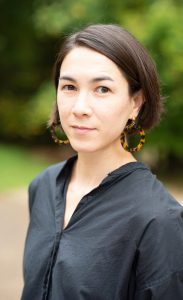
Kristin Gee Hickman, an assistant professor of anthropology and international studies in the University of Mississippi’s Croft Institute for International Studies, will spend two months next summer in France conducting archival research, thanks to a Summer Stipends grant from the National Endowment for the Humanities. Submitted photo
OXFORD, Miss. – A University of Mississippi professor has received a National Endowment for the Humanities grant to fund preliminary research for a new book project she’s developing.
Kristin Gee Hickman, an assistant professor of anthropology and international studies in the UM Croft Institute for International Studies, will spend two months next summer in France conducting archival research, thanks to a Summer Stipends grant from the National Endowment for the Humanities, or NEH.
The program aims to stimulate new research in the humanities and its publication by providing small awards to support advanced research that is of value to humanities scholars and general audiences. While the program funds projects that are at any stage of development, it is specifically intended for early-stage research and late-stage writing in which small awards are most effective.
“I’m going to France to research the different types of sub-Saharan African migrants who have passed through Morocco over the last century-and-a-half, and how Moroccans have responded to these migrants at different points in time,” Hickman said. “The expected output of this research is a book, which has the tentative title ‘Brother and Others: Representations of Black Migrants in the Moroccan National Imaginary.’
Hickman, who joined the Ole Miss faculty in 2019, specializes in Morocco, and her research examines the relationship between language, politics and cultural production in contemporary urban Morocco.
She has worked and researched in Morocco and also has studied in Egypt, Oman and France.
In her dual role in the Croft Institute and the Department of Sociology and Anthropology, Hickman teaches courses in anthropology and Middle Eastern studies, so research under her NEH grant also will assist her in the classroom.
“We are so proud of Dr. Hickman,” said Jeff Jackson, chair of the Department of Sociology and Anthropology. “This is a very prestigious grant that is awarded to only a very small number of scholars nationally.
“She is becoming a real leader in her fields of research, which is terrific for her and for all of us here at the University of Mississippi.”
Although Hickman was notified of the grant in April, after talking with the NEH, she postponed her French travel until June-July 2022 because of the COVID-19 pandemic and travel restrictions.
“It was a very pleasant surprise at the end of a challenging academic year (to hear the news about the grant),” Hickman said. “I’m incredibly honored to be receiving this grant, particularly as a junior scholar. It’s highly competitive. This year, only 11% of applicants were selected.”
For the first month of her stipend, Hickman will be researching in Nantes, France, at the Centre des Archives diplomatiques, which is part of the French diplomatic archives. For the second month, she will be in Paris, researching at the Bibliothèque nationale de France, which is the national library of France.
She also will research at the musée du quai Branly – Jacques Chirac’s Media Library, which contains a collection of 300,000 works from Africa, Asia, Oceania and the Americas.
Morocco was a French protectorate from 1912 to 1956, so most of that period’s archives are in Nantes. Hickman researched at the archives as a graduate student at the University of Chicago, where she received her master’s and doctorate in anthropology, to explore how Arabic teaching methods changed in Morocco during the French protectorate.
For this visit, she’s researching a new set of questions in the archives.
“When we think of Africa, we typically imagine it as being clearly divided into North Africa and sub-Saharan Africa, with the Sahara desert as the dividing line between the two,” Hickman said. “But as numerous scholars have shown, there has actually been an enormous amount of movement across this ‘border,’ both historically and in the contemporary era.”
For her Summer Stipend, Hickman is studying the diversity of sub-Saharan African migrants who have traveled to and through Morocco, as well as the diverse ways Moroccans have reacted to these migrants.
“The sub-Saharan African migrants, who have passed through and continue to pass through Morocco, are an incredibly diverse group of people,” she said.
Some of those migrants are “Muslim pilgrims visiting saints’ tombs, west African soldiers serving in the French colonial army and tasked with ‘pacifying’ the Moroccan population, anti-colonial activists working with Moroccans against French colonialism, exchange students studying at Moroccan universities and migrants using Morocco as a launchpad to Europe,” she said.
Hickman will explore how Moroccans have perceived these various groups of migrants in different ways. Her hunch is that while some migrants were welcomed as fellow Muslims or anti-colonial brothers-in-arms, others were racialized as Black and “African,” even though Morocco also is located on the African continent.
“I think that it’s important to ask these kinds of questions for several reasons,” Hickman said. “First, they provide insight into how Moroccans imagine themselves as a nation; after all, it’s by defining ‘others’ that we come to define ourselves.
“Second, they challenge the assumption that North Africa and sub-Saharan Africa are two separate entities, and that the latter somehow don’t belong in places like Morocco – a belief that enables contemporary anti-Black racism in Morocco. Third, they shed light on racialization as a global phenomenon that happens beyond the United States.”
Summer Stipends provide $6,000 for two consecutive months of research and writing. Recipients must work full-time on their projects for these two months.
To further fund Hickman’s work, the university is providing $6,000 more to Hickman for her stipend, with $3,000 from the College of Liberal Arts and $3,000 from the Office of Research and Sponsored Programs.